Yemeni Food
Yemeni cuisine is entirely distinct from the more widely known Middle Eastern cuisines and even differs slightly from region to region. Typical Yemeni dishes, that resemble stews and are eaten with bread, are cooked in traditional black, stone pots (called madara) that have age and character. Famous stew dishes include salta, fahsa, and odgat. Yemeni cuisine also includes mandi, which are the huge rice dishes with meat on top. Yemeni desserts are also very unique and heavy with dates, bananas, bread, honey, cheese, and cream.
salta (سلتة)
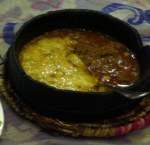
|
Although each region has their own variation, salta (سلتة) is considered the national dish. The base is a brown meat stew of Turkish origin called maraq (مرق), a dollop of fenugreek froth, and sahawiq (سحاوق) or sahowqa (a mixture of chillies, tomatoes, garlic and herbs ground into a salsa.) Rice, potatoes, scrambled eggs, and vegetables are common additions to saltah. It is eaten traditionally with Yemeni flat bread, which serves as a utensil to scoop up the food.
|
fahsa (فحسة)
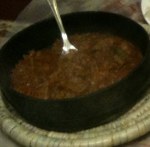
|
Fahsa (فحسة) is a Yemeni stew made of lamb cutlets into a lamb soup with spices and holba (fenugreek).
|
ogda (عقدة)
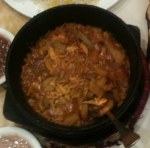
|
Ogda (عقدة), meaning knot, is a stew made from tying and mixing all the ingredients together. There are many types of ogda and it can be made with small pieces of lamb, chicken, or fish that is mixed and cooked together with any vegetables including tomato, carrot, potato, zucchini, etc.
|
mandi (المندي)
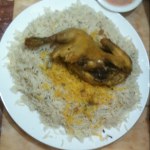
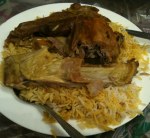
|
Mandi (المندي) is the traditional dish in Yemen native to Hadhramaut Province and many other Yemeni cities. It is now very popular in the rest of the Arabian Peninsula. Mandi is usually made from meat (lamb or chicken), basmati rice, and a mixture of spices. The meat used is usually a young and small sized lamb to enhance the taste further. The main thing which differentiates mandi is that the meat is cooked in the tandoor (taboon in Yemeni) which is a special kind of oven. The tandoor is usually a hole dug in the ground and covered inside by clay. To cook mandi, dry wood is placed in the tandoor and burned to generate a lot of heat turning into charcoal. Then the meat is suspended inside the tandoor without touching the charcoal. After that, the whole tandoor is closed without letting any of the smoke to go outside. Raisins and pine nuts can be added to the rice as per one's taste. Mandi is also considered as the main dish served in special events such as weddings and feasts.
|
mashwi (مشوي)

|
Mashwi (مشوي), meaning grilled or roasted, is the whole fish grilled in the oven and served simply with lemon slices.
|
fatta (فتّة)
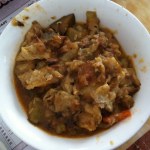
|
Fatta (فتّة), meaning crushed or crumbs, is a sort of bread soup made with pieces of the Yemeni bread bits mixed with meat broth and cooked vegetables making it soggy and mushy. As flatbreads quickly tend to get stiff when exposed to air, it is indeed a way of using stale bread. Fatta can also be made as a dessert with sweet ingredients including dates and honey. In Yemen, fatta is a common meal during the month of Ramadan.
|
maraq (مرق)
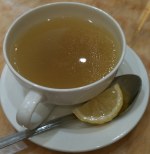
|
Maraq (مرق) is a Yemeni broth soup served at the beginning of the meal. It comes with a slice of lemon to squeeze into the soup.
|
sahawiq (سحاوق)
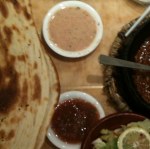
|
Sahawiq (سحاوق) is similar to Mexican salsa as it is cut up vegetables, with a tomato base usually including peppers, onions, and goat cheese. Consistency of the sauce runs from diced and chunky all the way to pureed, and even the style served at the same restaurant changes daily, sometimes red, sometime green with more emphasis on peppers, sometimes chunkier, sometimes smoother, sometimes with more cheese and sometimes with less. Sahawik is generally served with the meal as a sauce to add in the soup, salad, stews in the black pots, with the bread (quite like eating chips and salsa), or really anything you like.
|
| |
Yemen
Yemen is a country of history and civilization. You can not mention history without mentioning Yemen. You can see that history still exists there in front of your eyes. Yemen and history are inseparable. Yemen is the origin of Arabs and Arabism; the country of faith and wisdom.
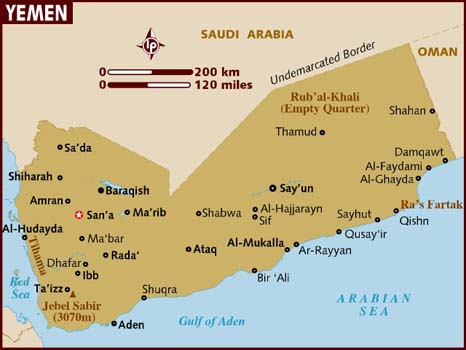

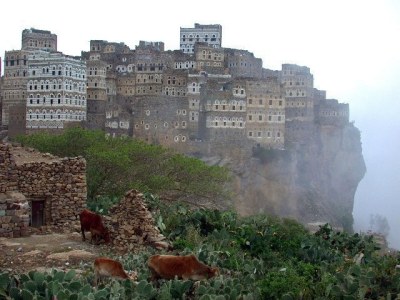



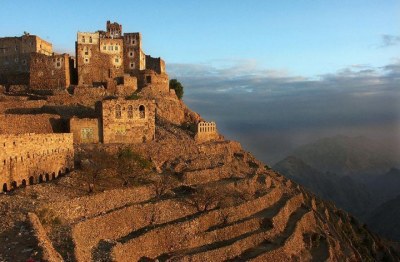
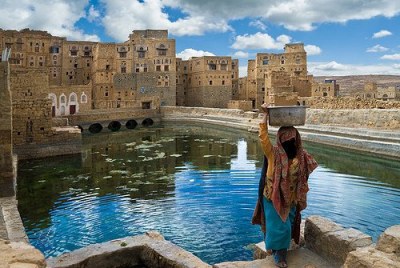
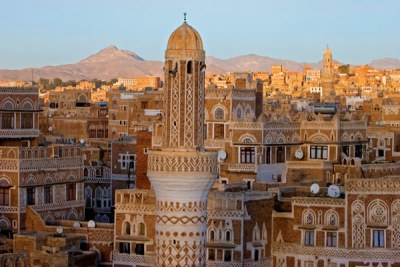
| |

